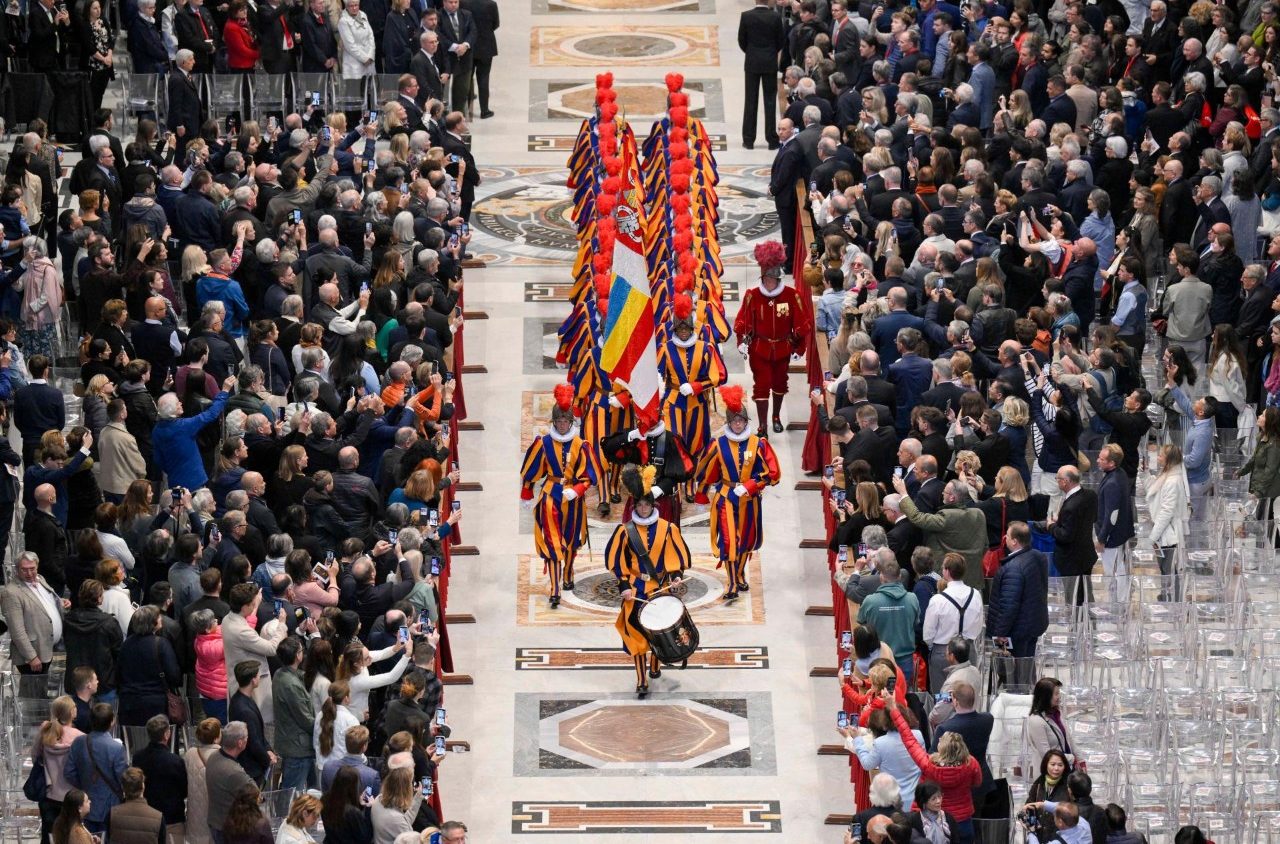Vatican City – Times have changed, and in the small City-State governed by the Successor of Peter, the atmosphere is no longer the same. If the years of Jorge Mario Bergoglio’s pontificate were dominated by a Vatican Gendarmerie engaged in a perpetual game of “cops and robbers,” today the picture looks profoundly different. For the first time in decades — the last being Paul VI — a Pope has personally attended the swearing-in ceremony of the Pontifical Swiss Guard. An event of great significance for those who, since 1506, have watched over the safety of the Roman Pontiff.
These are young Swiss men who choose to live this experience in the Eternal City, moved by faith and devotion. For them, the Pope’s presence represents a deep acknowledgment, since this ceremony marks a pivotal step in their journey and reunites their families in Rome to share in their joy. Their daily life is one of discipline, commitment, and authentic relationships: strict schedules, demanding activities, yet also friendships and passions that blossom within the Vatican walls. Each day they offer a smile to the many clerics and employees of the Holy See and Vatican City State, and with equal courtesy, they welcome pilgrims and tourists, always ready to help those seeking information or support.

Gendarmerie and Power Struggles
The Francis years brought a drastic reduction in the role of the Swiss Guard, which for centuries had been the only corps allowed access to the Apostolic Palace and charged with ensuring the Pope’s personal protection. The Argentine Pontiff chose instead to favor the Vatican Gendarmerie, a body that includes figures excluded from Italian police forces, often admitted thanks to recommendations from prelates or powerful intermediaries. A reality, therefore, far removed from the seriousness and discipline that have always distinguished the Pontifical Swiss Guard. Indeed, there is no public competition to join the Gendarmerie, and selection follows opaque and personalistic logics, more bound to favoritism than to merit.
Throughout his pontificate, Bergoglio even appointed a gendarme as his personal driver and a former gendarme as his butler. He allegedly ordered illegal surveillance and wiretaps, checks on the IOR accounts (and beyond), and rewarded those who carried out such activities with cash payments drawn directly from the Santa Marta safe — the same safe from which his butler was sent to pay for books at the Vatican Bookstore. A Curial cardinal told Silere non possum, and his words were confirmed by other witnesses working daily with the Pope: “Those men never returned empty-handed from Santa Marta.”
Behind its façade of legality, the Vatican Gendarmerie cultivated murky ties with Italian circles, far removed from the integrity and loyalty of the Swiss Guards. This modus agendi took root under Domenico Giani, the man who imported into the Vatican a system of surveillance, collusion with the Guardia di Finanza, dossiers, and rumor-mongering against clerics. When Bergoglio decided to dismiss Giani — after he used funds from the Corps to renovate his own house — he nevertheless ensured him a safe position as ambassador to the Order of Malta. A cardinal bitterly commented: “Remember, people like that can’t simply be left at home, not with all they know. They know too much.” The result is clear: no one wants to live in the Vatican anymore, many have moved their money outside the IOR, and numerous clerics prefer to exercise their ministry elsewhere.
Changing of the Guard
With Leo XIV, however, something has finally broken. The new Pontiff has begun to dismantle the power networks and collusions that dominated the previous era. Stefano De Santis, long at Bergoglio’s side during his travels, has disappeared from view: today he is embroiled in a case many call the “Vatican Garlasco affair.” A magistrate accused of ambiguous relations with a fraudster and a Gendarmerie officer, De Santis himself, who allegedly leaked confidential information.
The difference, however, is that — unlike the original Garlasco case — here no prosecutor seems willing to pursue searches or real investigations. Those accused of grave misconduct remain comfortably in office, showing no intention to resign. But Leo XIV wanted to send a strong signal, clearly indicating the direction he intends to take: everyone back in their rightful place. At the Pontifical Swiss Guard’s oath ceremony, he personally attended, and afterward, returning by car to the Palace of the Holy Office, he confided to his aides that he had been deeply moved and impressed by what he had witnessed. In his concluding address, the Pope said: “I thank you, in my name and that of the entire Holy See, for your service.”Simple yet solemn words. “A Pope who once again looks with respect to those who serve in silence, far from power games and systems of control,” an archbishop remarked while leaving the Cortile del Belvedere.
d.D.R.
Silere non possum